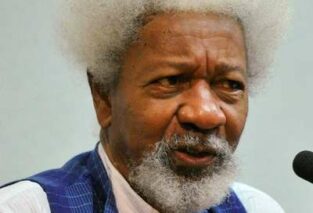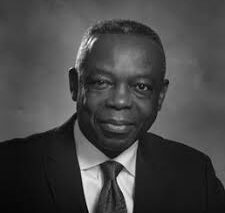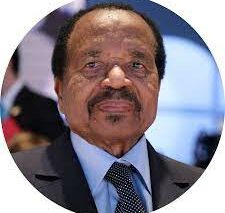The January 1991 issue of Cameroon Life Magazine carried an interview I conducted with Professor Steve Arnold of the Department of Comparative Literature of the University of Alberta in Edmonton, Canada. In it, Professor Arnold talks lengthily about the Association of Creative Teaching (ACT), a once vibrant joint project of the University of Guelph (Ontario, Canada), under Professor Douglas Killam and Mrs. Elizabeth Cockburn, and the Yaoundé University Department of Comparative African Literatures under Professor Bernard Nsokika Fonlon. Unfortunately, ACT, that worthy project followed Dr. Fonlon to his grave! How sad!
Professor Arnold, a few years ago, you were in Cameroon to visit the grave of your friend, Professor Bernard Nsokika Fonlon, who died in your country, Canada, in August, 1986. Today, you’re back in Cameroon. Tell us about your present visit.
I’m on my way to speak at a conference in Nigeria. Family members here waited for this occasion to hold the baptism of my first grandchild, which is a far more important motive for a visit. I also took advantage of this brief passage to update my knowledge of Cameroonian literatures, something I have tried to do periodically since the 1970s when I was part of a team of scholars organized by the International Comparative Literature Association to write A Comparative History of African Literatures in European Languages.
How did you become involved in that project?
In the early 1970s, I had taught and done research in Tanzania. Since I had published some articles on Tanzanian literatures and cinema, the History’s Editor, Professor Albert Gérard, asked me to write a chapter on Tanzania. When I finished that task in 1978, I noticed that none of the approximately 150 African and European scholars on the list of contributors indicated Anglophone Cameroon as a chapter in progress. I wrote to the Editor to point this out and he asked me to attempt to find out what literary activity there was in Anglophone Cameroon. Soon after, I came with a young Sierra Leonean colleague, Abioseh Porter, to wander around Cameroon for several months looking for writers of literature in English.
Who are the Cameroonian writers who have become known abroad as a consequence of your visit to Cameroon?
I hesitate to answer because there are many, and I wouldn’t want to slight any of them by leaving them off what is basically a spontaneous list. But let me mention a few and hope that I not offending any individuals by leaving them out. The reputations of Bernard Nsokika Fonlon, Sankie Maimo, Kenjo Jumbam and Victor Musinga are still increasing. “New: voices are those of Nsanda Eba, Bole Butake, Albert Mukong, Bate Besong and some others whose names don’t come to mind readily now. I don’t have time to keep up with all that is happening, and my present preoccupations are with other literary events in Cameroon such as the programs of the Association of Creative Teaching (ACT), an association which was begun with Canadian assistance.
Let’s talk about ACT. What is it all about?
Once again I must point out that I am only one among many people who could answer such a question. My view of ACT comes first from my friendships with Dr. Fonlon and Dr. Douglas Killam. Through them I met the most important persons in ACT, that is, Mrs. Elizabeth Cockburn and Mr. Patrick Mbunwe-Samba. But let me approach your question historically. From about 1969-1971, Mrs. Cockburn was teaching in a GTTC in the Bamenda area. Her students had little experience with literature and few books to read. To fill the vacuum, she had them write their own stories. Their enthusiasm for this task and the quality of their productions were considerable. Back home in Canada, Mrs. Cockburn reflected for almost a decade on her Cameroon experience. In 1981, she returned to Bamenda and helped to establish an organization which would, among other things, help teachers cope positively with the problems of having few literary books available in English, most of those being outmoded Victorian literature imported from Britain.
Was this some form of creative writing course?
From its outset, ACT stressed that students and teachers could produce their own literature. For the programs of ACT to take root, funding was needed; so the enterprising Mrs. Cockburn introduced Professor Fonlon, Head of the University of Yaoundé’s Department of African Literatures to Professor Douglas Killam, Head of English at her home University of Guelph, in Ontario, Canada. Together, they prepared an elaborate proposal which they sent to the Canadian International Development Agency (CIDA) for funds to support the “Guelph-Yaoundé Project” (“GYP”). CIDA funded the said project for five years from 1983 to 1988 and called it “The Training of Teachers in the Field of African Literature.” The project was to link the efforts of two universities – Yaoundé and Guelph – in research in oral literatures and to establish courses in African literatures. The most important element, however, was the Association for Creative Teaching (ACT), an organization whose programs aimed to stimulate self-reliant, locally-driven educational innovations. With Mrs. Cockburn as the CIDA consultant for ACT, and Mr. Patrick Mbunwe-Samba as its regional coordinator in the Northwest Province, and Mrs. Pamela Martin acting in a similar capacity in the Southwest Province.
ACT was able to grow in less than a decade from an association of about eight or nine chapters in the Northwest Province to one with about thirty chapters in the three provinces of the Northwest, West and Southwest, and whose successes have drawn attention from countries such countries as Ghana and China. The university involvement in ACT has been discouraging, but at the elementary and secondary school levels, ACT has been very effective at achieving its objectives.
What are those objectives and how far have they been pursued?
Roughly they are: 1) to introduce students to the appreciation and study of literature and related literary material – drama, radio, film, video – through the cultivation of responses to materials drawn from their own cultures, oral and written; 2) to develop and implement programs in resource-based learning for creative teaching, using human resources and materials available locally; 3) to establish networks of educators at the district, provincial and national levels, willing to share innovative educational techniques; 4) to teach simple techniques of creating and running libraries in primary schools; 5) to collect, preserve and use the oral heritage; 6) to institute regional radio programs involving students and teachers, etc. One of the most significant achievements has been the summer workshops run in July and August every year by members who come from the Canadian Teachers Federation. Some 4,000 Cameroonian educators have benefited from these meetings where innovative techniques are discussed and demonstrated. To me, however, the greatest success of ACT has been to promote the creation of literature by primary school pupils and their teachers. I have seen some of their creations, and many are excellent. Because of ACT, Anglophone Cameroon has moved from being a region which was among the most disadvantaged in Africa, to being a center of innovation, which is being watched around the world. What problems, if any, has ACT been facing? Here again, its founders and its organizers are the best people to ask, buy my own disinterested perspective may have some value. I see three main problem areas: 1) failure to achieve vertical integration; 2) unclear theoretical formulations; and 3) financial and political problems.
Maybe we should take them one by one. Tell us more.
For reasons unknown to me, the University of Yaoundé has not made the contributions that CIDA expected. This may simply be due to the unfortunate death of one of the leaders of the entire set of the Geulph-Yaoundé Project initiatives, Dr. Fonlon. He had the clarity of vision and political knowledge to see that the project was implemented. Except for a major conference in 1985 on oral literature at the University of Yaoundé, very little has been done by the University, a fact which must have contributed to the failure of CIDA to continue funding. The University of Yaoundé was to have been a center for theoretical work on oral literatures by ACT at the primary and secondary school levels in the provinces. Vertical integration of the entire education system with respect to oral and written literatures should have been led by the University, but it was not achieved. This, I think, is the problem of theoretical clarity.
In 1984, the famous Nigerian writer, Chinua Achebe, helped an ACT seminar at the University of Guelph achieve greater clarity than it had had in its beginnings, but his lessons did not reach the Yaoundé University people: they only reached ACT activists at the secondary and primary school levels. The most graphic expression of this flaw was seen at the 1985 Yaoundé Oral Literature Conference, which was supposed to have a dual practical and theoretical focus. The conference was dominated by theoretical discourses, mainly by francophones, who had never even heard of the experiments of ACT, and almost no one among them had practical concerns; a marvelous opportunity for progress was thus missed. Fortunately, since then, ACT has begun to be appreciated among some francophones, and because of that, there may yet come the realization that theory grows from practical activity and vice versa. The third set of problems – political and financial – are probably linked, but here again we see through a glass darkly.
It is good for an organization like ACT to have a much autonomy as possible from government, from bureaucratization. ACT and like organizations exist in part in order to undertake experiments free from official interference; if they innovate, government can then appropriate the innovations. But this need for autonomy does not absolve government from responsibility. A Canadian parastatal agency and several Canadian private organizations brought ACT to its present position of prestige earned through success. One of the understandings that the Canadian donors had when they made the substantial grant to the project was that the leadership of ACT would be seconded to ACT from their regular positions of employment, with salaries paid by the Cameroon government through the Ministry of National Education. This was never done, another reason, perhaps, that contributed to the failure of an effort to get funding renewed. The result has been that ACT has had to depend entirely upon the generosity of donors. Volunteers get exhausted. It is time, therefore, that a minimal gesture of secondment be made by government.
I recall you mentioning in another interview I had with you some years ago that you thought government could sacrifice a few Mercedes Benzes to keep afloat Abbia, the magazine Fonlon started and which, unfortunately, seemed to have followed him to the grave. The same could perhaps be said about keeping ACT alive, don’t you think?
You’re definitely right. Dr. Fonlon’s wonderful review – Abbia – so vital to Cameroon’s national unity and international intellectual image, could be produced for five years for the cost of a single Mercedes Benz! The same can definitely be said for a splendid organization like ACT, though maybe the equivalent of one Benz a year might be necessary. And no matter how deep the economic crisis, government should never discourage successful educational experiments. To a very few secondments, I would add the provision of one four wheeldrive vehicle for each ACT provincial office in order for it to provide proper liaison among all the teachers served by the association. If some minimal assistance like this is granted from within Cameroon, then I am confident that external organizations will again begin to provide funds to ensure that Cameroon’s leading position in such program development is consolidated.
Professor Arnold, before I leave you, please tell us something about your trip to Nigeria. What are you going to talk about?
I intend to talk about Mongo Beti’s career in light of recent events in Eastern Europe, South, Central and West Africa. Given the speed of various historical reforms, I think that the day is coming soon when Beti will be recognized as Cameroon’s greatest writer of the 20th century, and probably the greatest African writer of the post-colonial period known as neo-colonialism. He is presently known primarily as the author of four anti-colonial novels written during the 1950s. Since then, he has published five novels and far more non-fiction it is on the non-fiction that I think his long term reputation will rest. I expect the speech will shock some people, but I also expect it will convince them. That, however, is the topic of another interview, one which I hope we can have in the not too distant future.


